Library of Congress
Cataloging-in-Publication Data
Selee, Andrew.
Decentralization, democratization, and informal power in Mexico / Andrew Selee.
p. cm.
Includes bibliographical references and index. Summary: Explores the democratization and decentralization of governance in Mexico and finds that informal political networks continue to mediate citizens relationships with their elected authorities. Analyzes the linkages between informal and formal power by comparing how they worked in three Mexican cities: Tijuana, Ciudad Nezahualcyotl, and ChilpancingoProvided by publisher.
ISBN 978-0-271-04843-7 (cloth : alk. paper)
1. Decentralization in governmentMexico.
2. DemocracyMexico.
3. MexicoPolitics and government.
I. Title. JL1229.D42S45 2012
320.972dc22 2010049709
Copyright 2011
The Pennsylvania State University
All rights reserved
Printed in the United States of America
Published by
The Pennsylvania State University Press,
University Park, PA 168021003
The Pennsylvania State University Press
is a member of the
Association of American University Presses.
It is the policy of The Pennsylvania State University Press to use acid-free paper. Publications on uncoated stock satisfy the minimum requirements of American National Standard for Information SciencesPermanence of Paper for Printed Library Material, ANSI Z 39.481992.
This book is printed on Natures Natural, which contains 50% post-consumer waste.
The research for this book began more than eighteen years ago, long before I ever realized it might one day be published or even publishable. In 1992, I moved to the city of Tijuana to work with a Mexican nongovernmental organization on migration and local development projects. The city was, at the time, in the midst of profound changes brought about by a still incipient process of political opening and a simultaneous empowerment of local government. I lived in Tijuana for almost six years in the midst of these changes and began to document some of the transformations on the ground that would later become the material for this book. I am grateful for all those individuals with whom I worked during those years, and I am still proud to consider Tijuana a second home.
I am particularly grateful to Jonathan Fox, Rod Camp, and Carol Wise, as well as two anonymous readers, all of whom reviewed this manuscript and made extensive comments that greatly improved the final product. Sandy Thatcher at Penn State University Press was the best editor an author could ever want. Peter Smith, Tonatiuh Guilln, Phil Oxhorn, Enrique Cabrero, Jesse Ribot, Tomila Lankina, Arturo Alvarado, Ariel Armony, David Crocker, Mac Destler, Ral Bentez, Lorenzo Meyer, John Bailey, Jess Silva-Herzog Mrquez, Rossana Fuentes-Berain, Leonardo Avritzer, Enrique Peruzzotti, Richard Stren, Marcus Melo, Blair Ruble, and Stephanie McNulty all helped shape my thinking on specific ideas raised in this book, and they have all pointed out issues that later found their way into the text. I am also grateful to Patricia Rosas for her work in editing the manuscript, which greatly improved the book.
For several years now, I have been fortunate to work at the Woodrow Wilson Center, which has allowed me to continue researching issues related to Mexico and the quality of democracy in the hemisphere. This book has been influenced by several research collaborations over these years, including projects with Jonathan Fox, Phil Oxhorn, Enrique Peruzzotti, Jacqueline Peschard, Cindy Arnson, Ral Bentez, Xochitl Bada, David Shirk, Eric Olson, Rossana Fuentes-Berain, Joe Tulchin, Robert Donnelly, Jorge Hernndez Daz, Leticia Santn, and Heidy Servin-Baez.
I am indebted to David Crocker and Mac Destler at the University of Maryland School of Public Policy, where I completed my Ph.D., as well as Mary Kay Vaughan, Bill Galston, and Roberto Patricio Korzeniewicz. I am also indebted to Christine Hunefeldt at UCSD (where I completed my M.A. a number of years ago) for introducing me to much of the theoretical literature that helped me begin to make sense of the issues in this book, and to Peter Smith for his many comparative insights.
In completing the research for this book, I benefited from a period of residency in the Center for Sociological Studies at El Colegio de Mxico and from a fellowship at the University of Marylands Institute for Philosophy and Public Policy. I am especially grateful to Arturo Alvarado and Gustavo Verduzgo for arranging the residency at El Colegio de Mxico. I am also thankful to Ral Bentez for receiving us in his home while my wife and I lived in Mexico City, and to Rossana Fuentes-Berain, who kindly lent me her office for a couple weeks as I was preparing the final manuscript.
In Tijuana, I am grateful to Tonatiuh Guilln and Sandra Dibble for their help in understanding municipal and state politics; to Lilia Len, a friend and former colleague, for her expert research assistance and analysis; and to Jos Luis Prez Canchola, Maricarmen Hernndez, Cristina Franco, and Oscar Escalada for insightful analysis of local political developments since I moved away from the city. Above all, my friends Carlos Mendoza and Concepcin Aguilar, along with their son Andrs, provided a home away from home in Tijuana, and they also shaped my understanding of the city in countless ways.
In Ciudad Nezahualcyotl, I benefited immensely from my conversations with Gerardo Salazar, Alliet Bautista, and Alma Aquino and from the expert research assistance of Jessica Hernndez. Martha Schteingart, Socorro Arzaluz, Ramn Rivera, and Gerardo Salazar generously shared their research, and my sister-in-law Adriana Vallejo provided us with a shared home a few miles away in Mexico City.
In Chilpancingo, I learned a great deal from Julio Csar Aguirre, Homero Castro, Silvia Alemn, and Silvia Castillo. I am grateful for the research assistance of Osiel Humberto Gonzlez and the historical insight of Pety Acevedo, as well as the constant hospitality of Elsa Romero and Edgar Pava who provided a home away from home when visiting the city and a roadmap through Chilpancingos past and present.
Most of all, I owe thanks to my wife, Alejandra, the center of my life, who offered not only moral support but also intellectual guidance to this project (and read the manuscript more times than either of us can count). This book is dedicated to her and to our daughter, Luca, who was born during the writing, with the hope that she may grow up with the promise of a better tomorrow for her two countries.

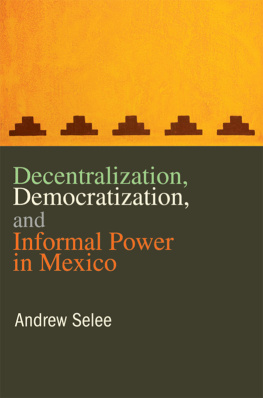

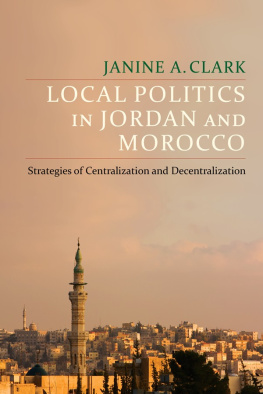
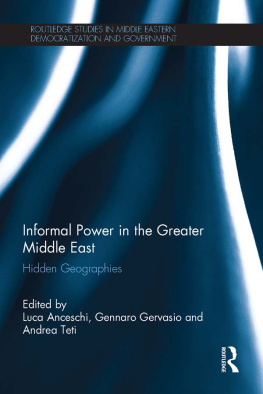
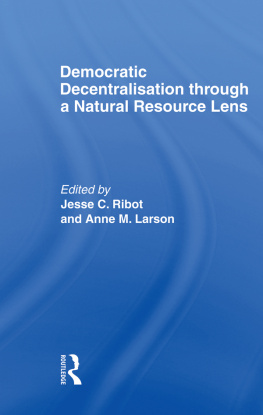
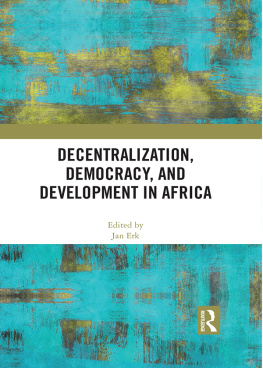
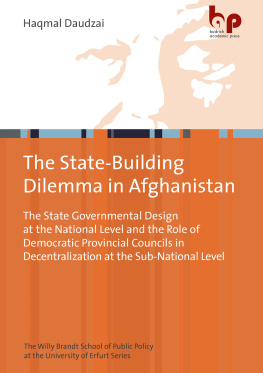
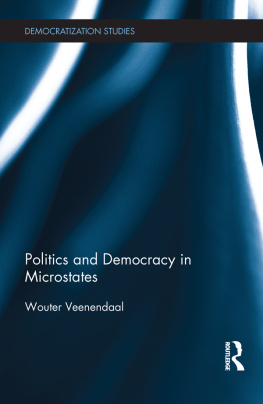
 In the 1980s and 1990s, decentralization reforms swept across Latin America and the developing world, as almost every country implemented measures to strengthen the authority and autonomy of local governments. Mexico was no exception. At least in formal terms, Mexico had been one of the most centralized countries in Latin America. From the 1930s to the early 1980s, a single party dominated almost all aspects of political life, including holding most elected positions. Between 80 and 90 percent of all public resources in the early 1980s were spent through national government agencies despite the nominal existence of a federal system. By the new millennium, however, Mexico had become a multiparty democracy and almost half of all public resources were managed at the state and local level. State and local governments, which had appeared to be mere appendages of an overwhelmingly dominant central state, now had a degree of discretion in spending and policy making they had not enjoyed in decades. Even more important, this process of decentralization took place in the context of a gradual process of democratization in which the country instituted truly competitive elections for the first time in decades.
In the 1980s and 1990s, decentralization reforms swept across Latin America and the developing world, as almost every country implemented measures to strengthen the authority and autonomy of local governments. Mexico was no exception. At least in formal terms, Mexico had been one of the most centralized countries in Latin America. From the 1930s to the early 1980s, a single party dominated almost all aspects of political life, including holding most elected positions. Between 80 and 90 percent of all public resources in the early 1980s were spent through national government agencies despite the nominal existence of a federal system. By the new millennium, however, Mexico had become a multiparty democracy and almost half of all public resources were managed at the state and local level. State and local governments, which had appeared to be mere appendages of an overwhelmingly dominant central state, now had a degree of discretion in spending and policy making they had not enjoyed in decades. Even more important, this process of decentralization took place in the context of a gradual process of democratization in which the country instituted truly competitive elections for the first time in decades.